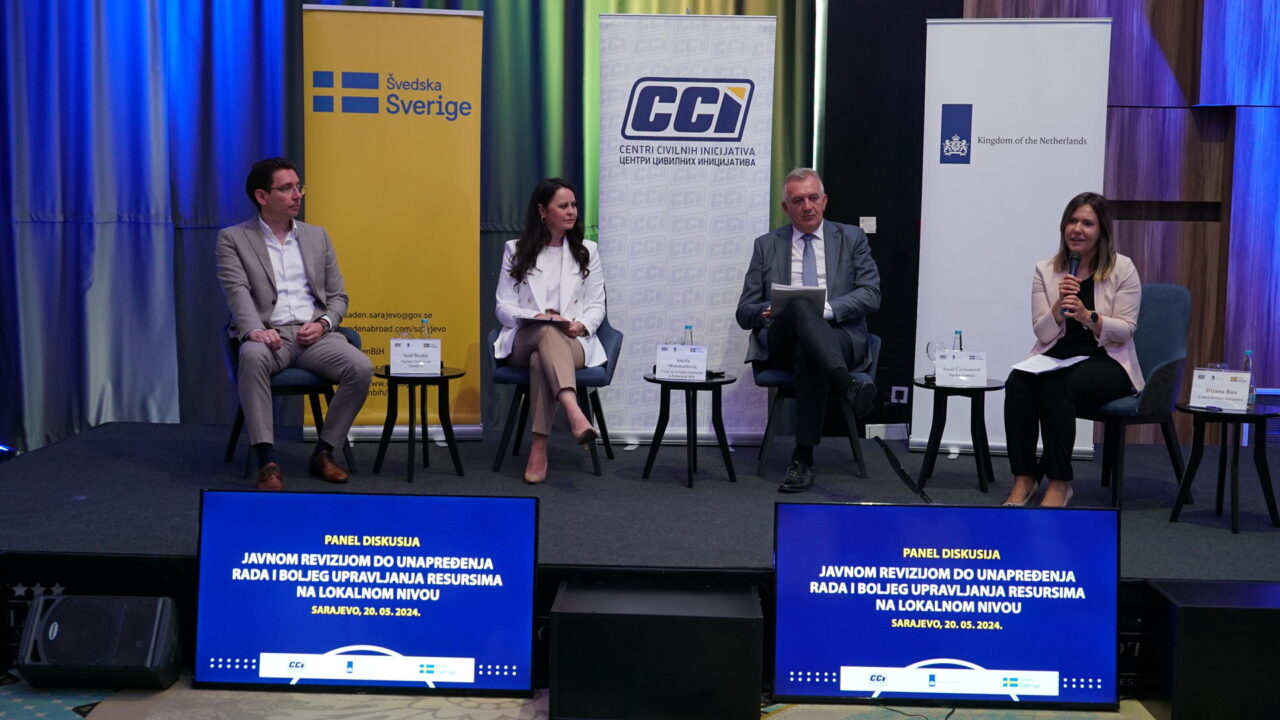The establishment of parliamentary oversight of the implementation of audit recommendations, along with the commitment of municipal and city leadership to give greater importance to addressing identified irregularities in operations, undoubtedly contributes to improving efficiency in public spending. This is demonstrated by good practices of local self-government units that have taken significant steps to eliminate irregularities and improve local administration. Namely, after oversight of the implementation of audit recommendations was introduced, a significant number of recommendations issued by the Audit Office of Institutions in the Federation of BiH were implemented in a short time, thereby eliminating most of the identified irregularities in the work and spending of public funds in the audited local self-government units.
These were the conclusions of today’s panel discussion, “Public Audit as a Tool for Improving Performance and Better Management of Resources at the Local Level”, organized by the Centers for Civic Initiatives (CCI) in Sarajevo.
The Audit Office of Institutions in the Federation of BiH conducted audits of 19 municipalities and cities in the Federation of BiH for 2022, delivering a total of 452 recommendations to those institutions for eliminating irregularities. Given that local governments have a direct impact on improving citizens’ quality of life, and that a significant number of irregularities related to public spending were identified, it is especially important that local administrations, once audited, establish oversight and continue monitoring the implementation of audit recommendations and the follow-up on audit findings.
“The importance of audits in local self-government units lies precisely in the fact that they are the level of government closest to citizens. The recommendations we issue should serve them to improve their operations, to spend public funds more efficiently, which ultimately increases citizens’ trust in this level of government. From the very beginning, starting with budget adoption, citizens should be involved in the process, and also in its execution. In audit reports, citizens can find information of interest to them, and implementation of recommendations will increase the confidence of all of us in that level of government or the institution being audited,” said Amela Mulahalilović, representing the Audit Office of Institutions in the Federation of BiH.
This is why CCI initiated the introduction of parliamentary oversight over the implementation of audit recommendations at the local level. As a result, in the previous period, 15 municipalities and cities reviewed audit reports at council sessions, and it is expected that institutions will report to local parliaments on the implementation of recommendations in the coming period. Among those 15, the panel presented examples of good practice from the municipalities of Kladanj and Stari Grad Sarajevo, which—through their approach to audit findings—corrected irregularities in operations and public spending, thereby improving citizens’ quality of life.
This makes the importance of improving the public audit process and following up on audit recommendations very clear.
“The moment any report is submitted to the Municipal Council session, it gains another dimension. The dimension of transparency and publicity, and it is only fair that councilors have complete information about what is happening at the local level. It is not only the mayor who is accountable before the council, but the entire administration is accountable before both the council and the citizens,” said Jusuf Čavkunović, Mayor of Kladanj.
“In general, parliamentary oversight is very important because it is exercised by representatives elected by the citizens. Also important is the link between the executive and legislative branches of government—in the case of a municipality, between the mayor and the municipal council. In the past, we did not have cooperation like we do now, so the municipal council was not even informed that an audit had taken place. The municipality stands on two legs—one is the mayor and the services, the other is the municipal council—and if you want a stable institution, both legs must be well coordinated,” said Seid Škaljić, Chairman of the Municipal Council of Stari Grad Sarajevo.
Today’s panel discussion was attended by representatives of municipalities and cities that are under audit this year, as well as representatives of municipalities whose audit reports were published last year, so that they could learn from good practices of parliamentary oversight over the implementation of audit recommendations in other municipalities—something that will undoubtedly facilitate their organization and future work on this issue. It was particularly emphasized that local self-government units are an integral part of the public sector and, as such, are obliged to apply the principles of efficiency, economy, and effectiveness.

